Selema Masekela Discusses The New Film “Sweet Adventure,” A New Love For El Salvador and His Not-So-New Music Career
“It’s literally the entirety of my life coming full circle in a way that I never thought I’d get a chance to do.”
We’ve done a few recent pieces on the surf adventure film Sweet Adventure. That’s because it’s one of our favorites of the year and we’re excited about its Stab Premium digital premiere next month.
In case you missed it: Sweet Adventure comes from the creative and delightfully quirky mind of South African director, Peter Hamblin. Peter’s the same gentlemen who brought us Let’s Be Frank starring Frank Solomon and RISS starring Carissa Moore. His new film is a slight departure from his previous character pieces as it’s not about a person, but instead it’s more of a love letter to El Salvador. The film stars Albee Layer, Matt Meola, Nora Vasconcellos, Selema Masekela, Bryan Perez, Marcello Castellanos and, of course, El Salvador — its muse.
Sweet Adventure’s forthcoming digital premiere, as well as its showing at the Solento Surf Festival this Friday, served as a good excuse to catch up with one of the busiest and most influential voices in action sports, Selema Masekela. Selema’s been prevalent for as long as most of us can remember. His body of work is extensive, from the Kelly Slater and Andy Irons opus, A Fly in the Champagne; to cameos in Point Break (2015); commentating in the animated film, Surf’s Up; hosting the X-Games for over a decade; hosting VICE World of Sports; having a stint at E!; and much more. Somewhere between his film and commentary work, he’s also recorded two full length albums under the stage name, Alekesam, with his music appearing in shows like Entourage and House of Lies.
We buzzed Selema to chat about Sweet Adventure, his recent trip to El Salvador, his film and documentary career and music.
Stab: Were you familiar with Pete’s work prior to Sweet Adventure?
Selema: I became familiar with Peter’s work from the Carissa documentary [RISS]. I was surprised that that movie didn’t make a lot more noise in the community. I thought it was so uniquely well done. It was highly creative and there was a cool vulnerability to it. And it was a great look at Carissa.
I found out he was South African and I had connected with him somehow online. I just was like, Man, I got to work with you someday. He said, Yeah, I’d love to do the same. We met physically for the first time in Jeffreys Bay at the contest in 2019, and we started talking and we exchanged information.
Then you linked up for Sweet Adventure about a year or so later?
It was during lockdown that he pitched me the idea on Sweet Adventure, which was wildly over the top. And I was like, How the hell are we going to do it in the midst of everything that’s going on in the world? But Pete is one of the most relentless creatives that I’ve ever met in my life. There’s just no such thing as No. And so we had some different surfers that we had picked that couldn’t make it happen. Then Albee, Matt and Nora just came together perfectly.
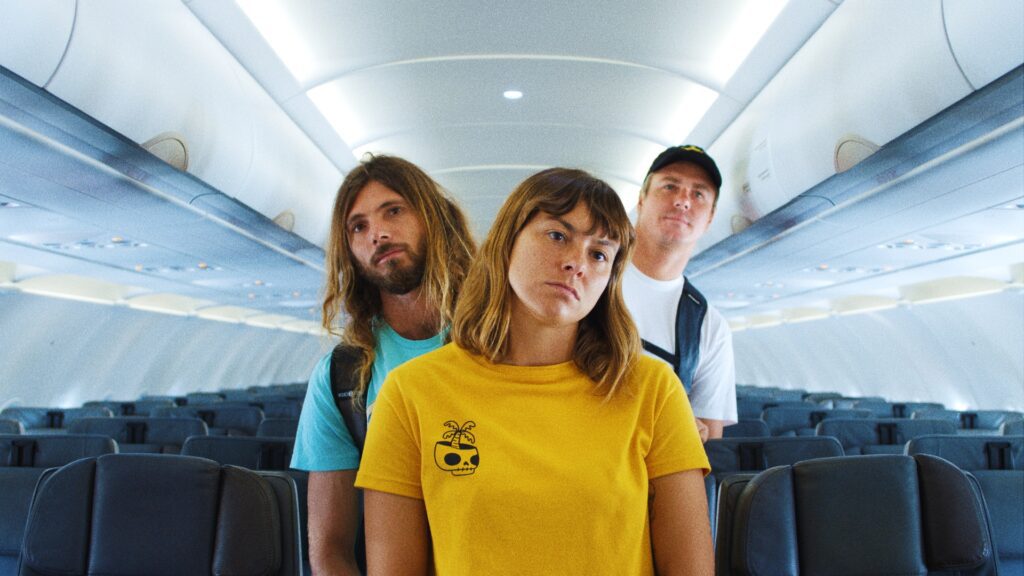
How did your role as the live narrator come about?
I was actually supposed to go down with them [to El Salvador] and shoot everything and be a subject. Then I had a job that I couldn’t get out of. And in pure Pete form, he was like, Well, we’ll figure it out, you have to be in it. We’ll get creative. And we talked about the theater idea and the guys at Brain Dead were super accommodating.
That pivot in plans seemed to work out well for the structure of the film.
It ended up being exactly what it was supposed to be. We shot all of that in a day from sunup to sunset. It was really fun. For me, it was a new way to play as I’ve narrated countless films, but to be the person who breaks this fourth wall, and to do it to a camera and an audience and be able to come alive more than in a standard voiceover was a blast. It forced me to dig a little deeper.
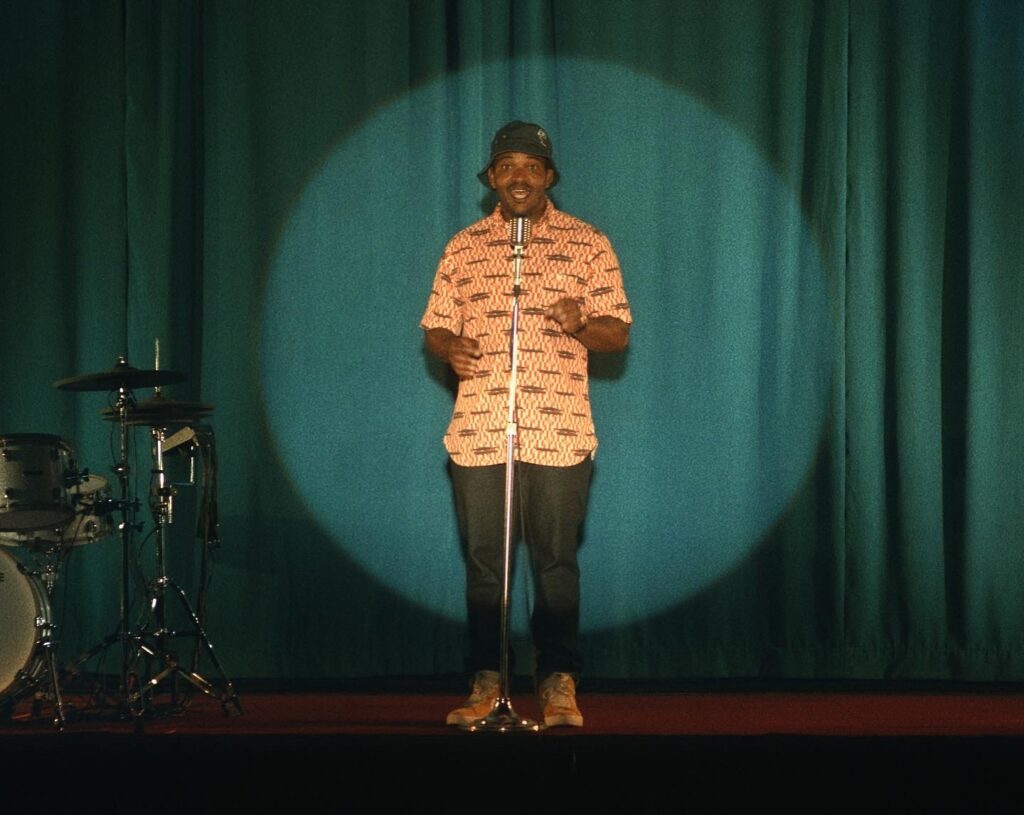
Your role really helped push the story along. The whole film felt like a breath of fresh air to the monotony that’s become surf content.
For the most part everybody’s making the same shit. There are a lot of athletes with an app who are making content to stay alive. So there’s such an overwhelming amount of stuff that it’s hard to get connected and feel engaged.
It feels like a surf film without narrative doesn’t mean much anymore.
If you want people’s attention now, it comes down to narrative. I don’t care how pretty your pictures are—everyone can edit, everyone’s got a drone, everyone’s got access to decent cameras, everyone can make their trip look awesome, but you need a stronger why?
I think Peter has figured out a way to split the difference and force the idea of narrative, which has always been important to me. My first exposure to surf films was the Chris Bystrom movies; Blazing Boards or Sun Of The Last Surf. That’s how I got introduced to surf movies. It was narrative. And it’s funny, I didn’t even know that most people thought those movies were kooky, but I thought, these are the best things ever. It’s how I learned about the culture.
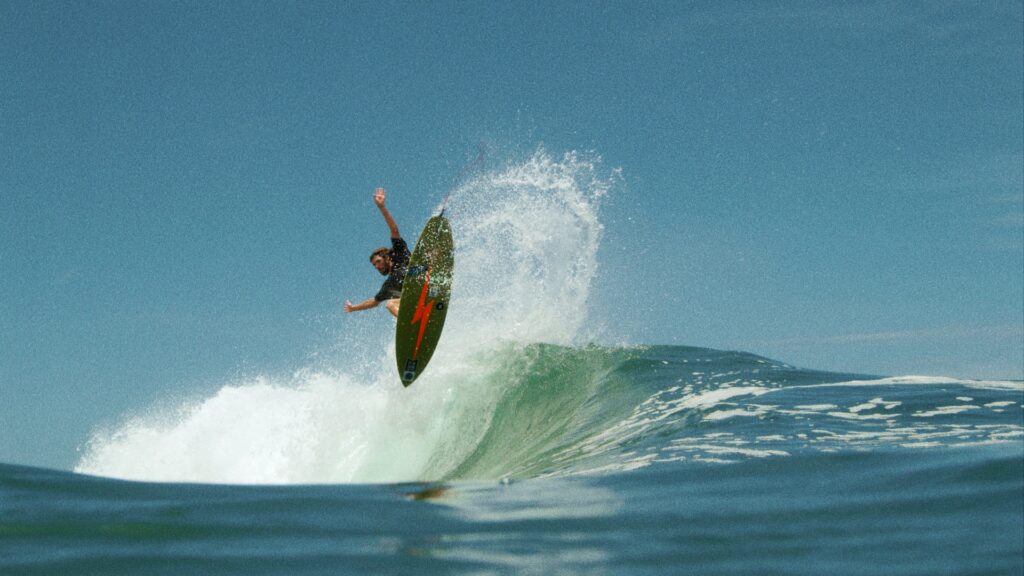
When you premiered it at Brain Dead Studios in Los Angeles, did it feel like the story landed?
I was blown away. People were standing around afterwards, just slack-jawed. To be able to have people’s attention for an hour in 2022 and after, all everyone’s talking about is the film, that’s an achievement.
A massive one.
And obviously, you’ve got really interesting characters in the movie in Nora and Albee and Matt. Just Matt’s singing alone coupled with the surfing is incredible. It’s so cool that it gets to breathe in a space like that. He’s amazing. There’s so much to him. And then El Salvador as a character just is so cool. You actually really feel like you’re in a modern discovery of a place and a culture in a way that’s not like, Yeah, we came, we showed up, we ripped, the locals praised us and we left. And that’s my favorite part. It’s a real love note to El Salvador and what its surf culture looks like and is.
Have you spent any time down there?
I finally did get to go. I just got back a couple weeks ago.
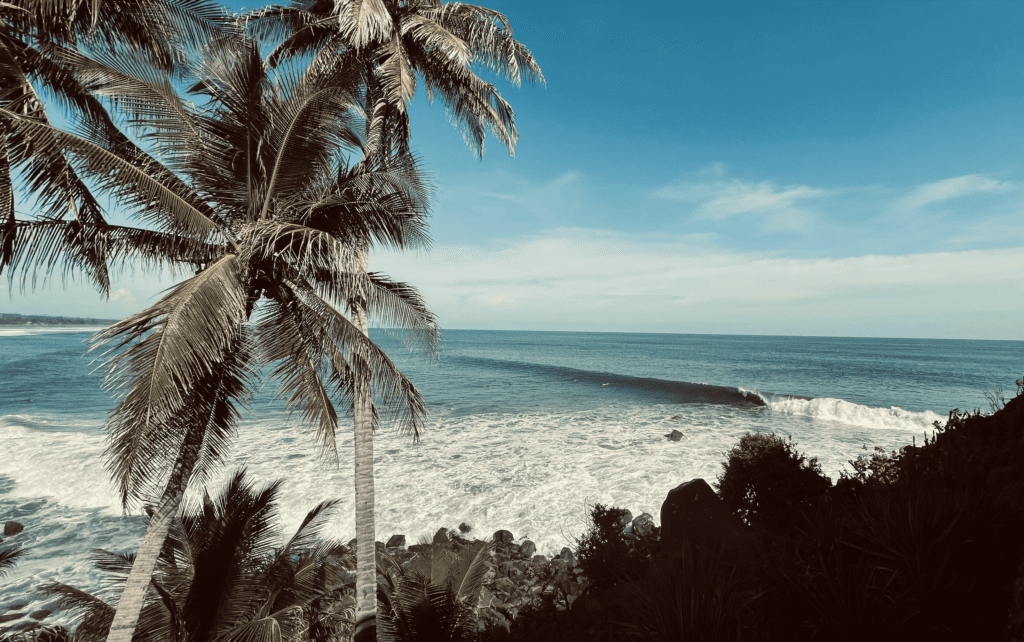
What did you make of it?
I fell deep, deep, deeply in love with it. It was amazing. My girl and I went together for two weeks and just had a blast. And the waves were pumping. Punta Roca, legitimately on its day, is Jeffreys Bay. Then there are so many other waves around it. And you’re also hiking volcano ranges and sulfur lakes and waterfalls and coffee farms and … The food. The people. It’s just a vibe, man. I cannot wait to go back. You feel that super special welcoming energy that you get in the movie. It’s a place that you got to go and respect.
It’s cool that the government’s pushing all this money into Surf City making surf tourism their thing. Did it feel like that’s working for the area?
Hundred percent. You can feel it and the people are welcoming it. You pull into El Zonte and all you see are signs that say Surf City. They understand what they have, and they very much want to retain and define what the culture and the surf economy looks like as a country as opposed to just expats coming and setting up shop, building hotels and defining what that is. The people are excited about it and proud of it.
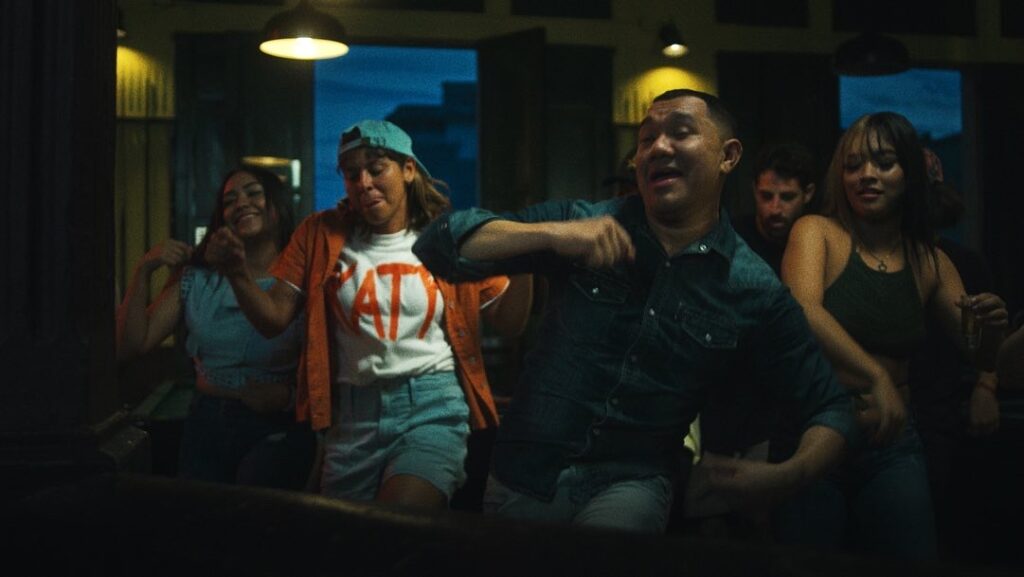
Definitely better to support the local community than the tradition of foreign travelers capitalizing on a region’s natural resources.
If you’re surfing Punta Roca and you show up with a camera, you can’t film there without paying. There are [local] guys who are there filming—they’ve literally got a media center on the beach with four or five cameramen, drones, and there’s a main guy who’s running cards. When you get out of the water, you just walk up to the little E-Z UP situation that serves beers and coconuts. The guys are sitting there running cards and running content and you come in and you check your clips and they give you a price and then Airdrop or Dropbox you your content depending on how much stuff you got that day.
Woah, sounds like a full operation.
It’s high-quality and they’re great. I got all of my clips the same way. It was awesome.
You’ve been involved in the surf world and “action sports” for as long as I can remember. How did your career come about?
I’ve always been very curious about storytelling. How I started in the industry was working at TransWorld and becoming very much fascinated with what it took to storytell and put together a magazine.
I was always fascinated with working with filmers. I was a team manager as well when I was at Planet Earth, where I was responsible for putting together shoots and stories. I got to work with Ty Evans early on before he became Ty Evans he is today there.
So I was lucky to always have my hands in and around and be in the orbit of really great young filmmakers and creatives in my journey within surf and action sports culture. When I started commentating and got to ESPN and learned that end of the craft as a broadcaster, I realized after a few years, that I had a little bit of a platform and that I should move to a place where I could be more creative and stimulated. And so I left the safety of North County and came to LA in the hopes of being able to figure out how to level it up and be a part of making documentaries and doing some storytelling alongside the stuff that I was doing in front of the camera. I started a production company [Emmy Award winning UXE] with my friend Jason Bergh, who’s a brilliant director, about 17 years ago. And that’s how I started to get involved in lots of projects. And it’s just been kind of trial and error and a whole lot of curiosity.
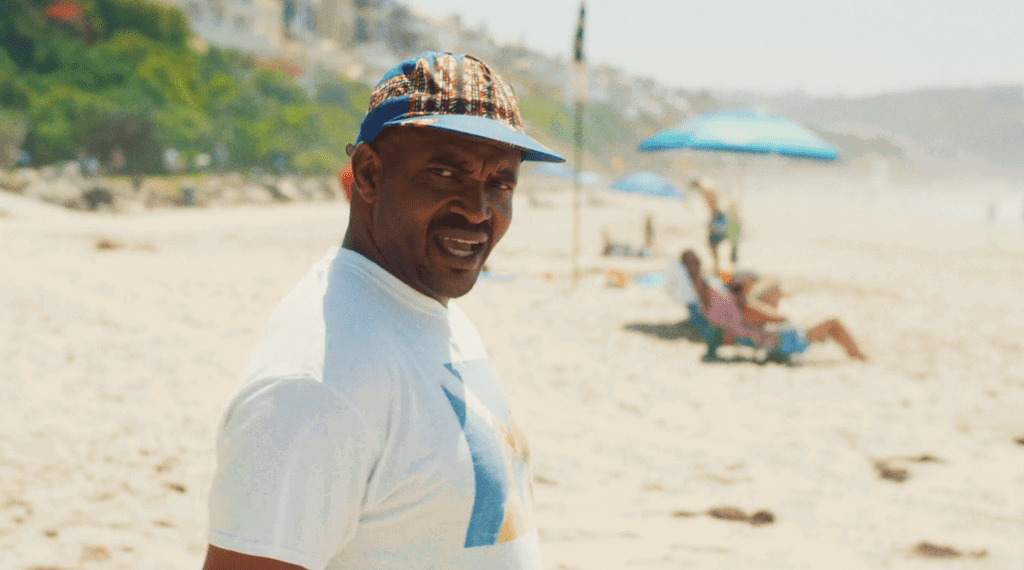
A lot of the music in Sweet Adventure was yours too, right?
Yeah, that’s me playing and singing in a few songs.
Can you tell us a bit about your music career?
I’ve been making music as Alekesam, which is Masekela backwards, since 2011.
I grew up in and around music. And music was my first exposure to storytelling. My father [Hugh Masekela—described as the father of South African Jazz] was an artist. My earliest memories were of me just being in the studio with him or being at the club with him when he was making records and when he was playing shows. I got to watch that creative process from a very young age. Music was a huge part of my life. I played in bands and sang in the choir in school. But when I moved to California [from Staten Island, NY] with my mother and stepfather, I was no longer in a place that was driven by the arts. I moved to a place that was driven by the art of movement — the art of surfing and skateboarding and snowboarding. As a teenager I was like, All right, let me figure this out.
Surfing really spoke to me in a way that was musical. I saw it as rhythmic, I saw it as dance, I saw it as a place to go out and build musical movement. So that kind of became my music for a while and obviously led to the career that we just discussed. But I always had this itch. I knew that there was music that I wanted to make. I was super intimidated by my father’s legacy and his name, so I didn’t want to be that offspring child who makes shitty music and uses his own name. And so I was scared for a long time to finally step up and be like, Am I crazy, or can I do this?
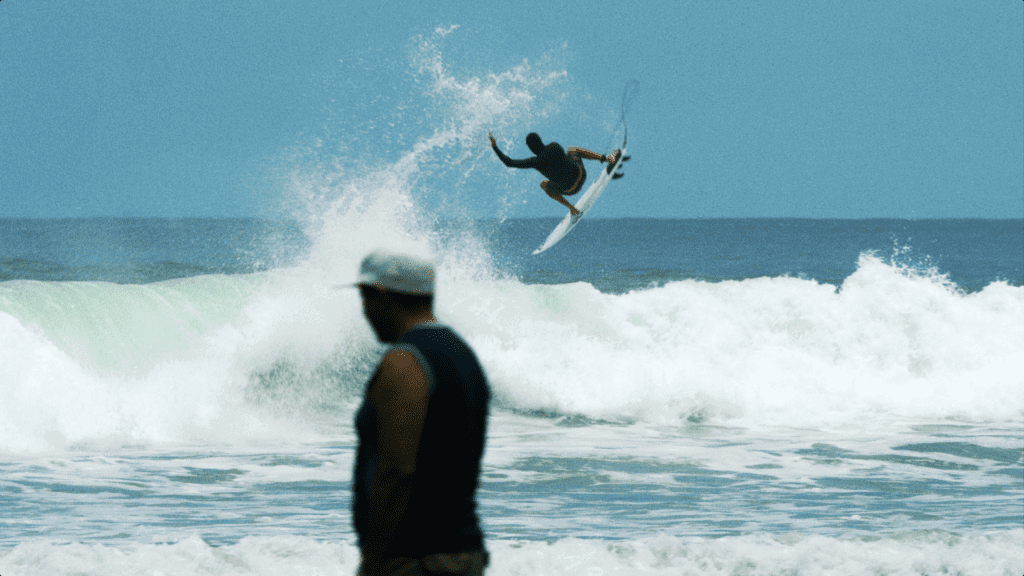
When did you decide to start putting some stuff together and out into the world?
I did a show at Entertainment for about four and a half years that was super taxing to my soul. The subject matter was gossip and shit like that. When that show got canceled, I just was like, I have to run from this and never go anywhere near anything like this again. It was the perfect time for me to start writing and to go in the studio with my cousin, Sunny Levine, and see if I was crazy or not—to see if I could make something of worth, something that I could be proud of and that maybe people would connect with.
I went by Alekesam strictly because no one was looking for a Sal Masekela record when I was still going by Sal. And I knew that the haters would be aplenty when they even found out that I was making music. You’ve got to look really close to recognize it’s Masekela, and for a long time people didn’t. The music was able to find its own level and I was able to get songs in a bunch of big shows and some commercials and got to go out and play and tour a bit with my band. When people like the music, I’m just humbled and blown away that they do.
When we spoke with Pete about the film, he was saying how impressed he was with your music. That he felt like he had half the soundtrack for the film after listening to your album during a late-night drive.
Peter didn’t know that I made music. We were talking at one point and I mentioned that I made music and he was like, Oh, send me some. And I was like, I’ll send you a link. I think I have a song that might go well in here, but I had no idea that it would end up being four songs.
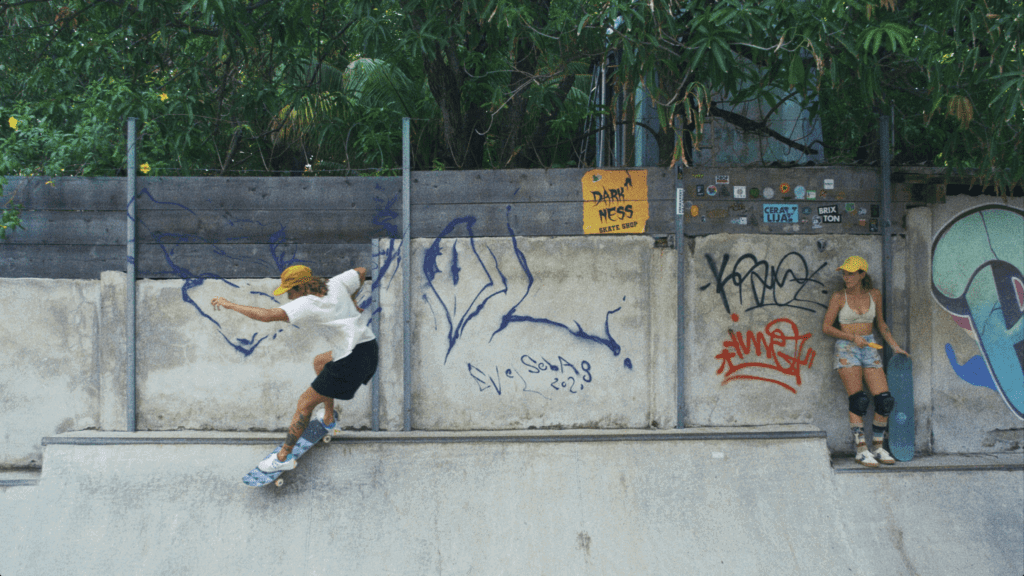
Rad how that’s a little Easter egg in the film.
To have my music be a part of narrating a surf adventure story, I mean it’s literally the entirety of my life coming full circle in all the aspects of me at play and in a way that I never really thought I’d ever get a chance to do. So it makes this film, for lack of a better phrase, it makes it “super special.” [Laughs]
Is there anything you want people to take away from your music?
Writing music is super personal, and your reason for the song no longer exists once it’s in the world. It’s whatever people want it to be and how they receive it. That’s my favorite part about music. You hate it, cool. You love it, cool. It tells you a story. When people tell me what they get from it, I’m just like, Wow, that’s not what I was thinking when I wrote it but it’s awesome that that’s what you get.
Any departing thoughts on Sweet Adventure?
Yeah, I’m just super stoked that this thing is out there. I’m so amped that it’s going to be on Stab and I hope people enjoy it. I hope it makes people want to travel and I hope it makes people remember the manner in which we need to honor the places that we go.
As surfers, we kind of can be bulls in the China shop. And I think it’s the kind of film that makes people realize, Oh yeah, when we go to a place, they’re sharing it with us and we should act accordingly.

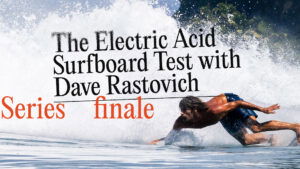












Comments
Comments are a Stab Premium feature. Gotta join to talk shop.
Already a member? Sign In
Want to join? Sign Up